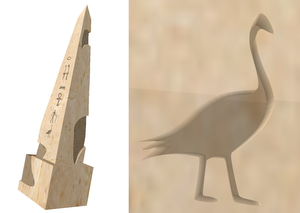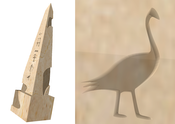Information
- Publication Type: Invited Talk
- Workgroup(s)/Project(s):
- Date: 2010
- Event: Visit of MPII in Saarbruecken
- Location: MPII Saarbruecken
- Conference date: 7. October 2010 – 8. October 2010
- Keywords: Diffusion curves
Abstract
Diffusion curve images (DCI) provide a powerful tool for efficient 2D image generation, storage and manipulation. A DCI consist of curves with colors defined on either side. By diffusing these colors over the image, the final result includes sharp boundaries along the curves with smoothly shaded regions between them. The first part of the talk presents a new Laplacian surface solver for a stable rendering of DCIs. It consists of a robust rasterization technique to transform the algebraic curves to the discrete image domain, and a variable stencil size diffusion solver that solves the minimal surface problem. The solver is proven to converge to the right solution, it is at least as fast as commonly used multigrid solvers, but much simpler to implement, works for arbitrary image resolutions, as well as 8 bit data. The second part of the talk extends the application of diffusion curves to render high quality surface details on 3D objects. The first extension is a view dependent warping technique that dynamically allocates more texture memory for details close to the observer. The second extension is a dynamic feature embedding technique that retains crisp, anti-aliased curve details even in extreme closeups. The third extension is the application of dynamic feature embedding to displacement mapping and geometry images. Our results show high quality renderings at interactive frame rates.Additional Files and Images
Weblinks
No further information available.BibTeX
@talk{jeschke-2010-diff,
title = "Rendering Diffusion Curves in 2 and 3 Dimensions",
author = "Stefan Jeschke",
year = "2010",
abstract = "Diffusion curve images (DCI) provide a powerful tool for
efficient 2D image generation, storage and manipulation. A
DCI consist of curves with colors defined on either side. By
diffusing these colors over the image, the final result
includes sharp boundaries along the curves with smoothly
shaded regions between them. The first part of the talk
presents a new Laplacian surface solver for a stable
rendering of DCIs. It consists of a robust rasterization
technique to transform the algebraic curves to the discrete
image domain, and a variable stencil size diffusion solver
that solves the minimal surface problem. The solver is
proven to converge to the right solution, it is at least as
fast as commonly used multigrid solvers, but much simpler
to implement, works for arbitrary image resolutions, as well
as 8 bit data. The second part of the talk extends the
application of diffusion curves to render high quality
surface details on 3D objects. The first extension is a view
dependent warping technique that dynamically allocates more
texture memory for details close to the observer. The second
extension is a dynamic feature embedding technique that
retains crisp, anti-aliased curve details even in extreme
closeups. The third extension is the application of dynamic
feature embedding to displacement mapping and geometry
images. Our results show high quality renderings at
interactive frame rates.",
event = "Visit of MPII in Saarbruecken",
location = "MPII Saarbruecken",
keywords = "Diffusion curves",
URL = "https://www.cg.tuwien.ac.at/research/publications/2010/jeschke-2010-diff/",
}

 image
image